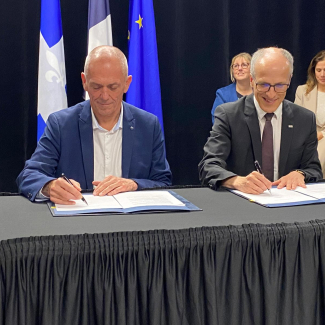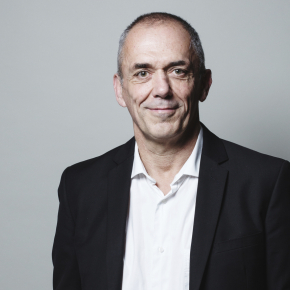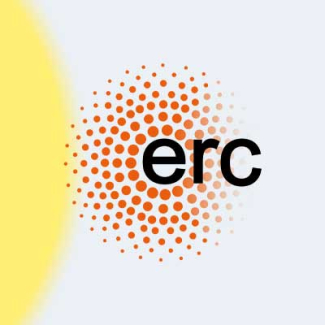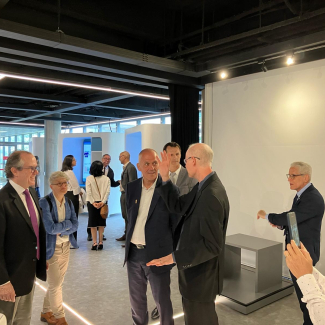
The new CNRS representative office in Kenya will help bolster our cooperation work in Africa
The CNRS has opened its eleventh office abroad, in Nairobi, Kenya. This new office is part of the organisation's multi-annual cooperation plan with Africa, as Antoine Petit, the CNRS Chairman and CEO, tells us.
Why is the CNRS opening a second office in Africa?
Antoine Petit: The CNRS realised its institutional links with partners in African countries were relatively weak and therefore set itself the objective of reviewing its cooperation strategy with these countries. This objective was set out in the CNRS's Objectives and Performance Contract (2019-2023) signed with the State and led to the development and publication in 2021 of a multiannual cooperation plan with Africa. From 2019 onwards, a lot of initiatives have been launched to find out more about the Africa's different research communities' cooperation requirements, set up institutional links to enhance support for those communities and co-construct scientific projects with our French, African and European partners. The aim of opening a new CNRS representative office in Africa is to increase these types of initiatives and help strengthen our scientific cooperation with Africa. The new office will complement the work of its existing counterpart in Pretoria, South Africa which is shared with the Research Institute for Development (IRD) and the French Agricultural Research Centre for International Development (CIRAD). The Pretoria office's work covers all the thirteen countries of southern Africa for the CNRS.
Why did you choose Nairobi in Kenya?
A.P.: The countries of East Africa are highly dynamic in terms of the quantity and quality of their scientific publications. Among these countries Kenya seemed an ideal candidate in more ways than one. Major reforms in Kenya have been carried out with the international community's support and these have made its economy one of the region's strongest thus helping Kenya rise to the rank of a middle-income country. Kenya has benefited from a significant level of political stability since independence, with its success based on a service economy (46.5% of GDP) which produces innovations that are replicated throughout Africa.
R&D and higher education are also important in Kenya which is a target destination for international students. Kenya possesses the highest ratio of scientists to population and is investing more in absolute terms to create a favourable environment for the development of research and science. The latter point is part of the Kenyan government's Vision 2030 strategy and should transform the country's economic base. Kenya's share of world scientific publications doubled between 2000 and 2019 and the visibility of the country's research was enhanced by an increased number of international collaboration projects spanning all fields of science.
The CNRS is the leading French partner with Kenya for publications in the fields of ecology, environmental sciences, geosciences and biodiversity. Twelve ongoing structuring projects1 led by the CNRS involve Kenya or a neighbouring country. Finally, the CNRS has also been able to count on the remarkable support of the French Embassy in Kenya to facilitate the installation of the office which will initially be located in the Embassy and also for organisation's introduction into the regional ecosystem.
Kenya is also a key entry point into the region, of course.
A.P.: Absolutely, yes. Kenya is a true international hub and plays a central role in the region, particularly within the East African Community common market. The quality of Kenya's logistical, financial and legal services combined with its relatively favourable business environment have made it a prime destination for French companies like Peugeot, L'Oréal, Saint-Gobain, Société Générale, Schneider-Electric or Total which use Kenya as an effective base to spread their influence throughout the surrounding region. France has been one of the top five overseas investors in Kenya since 2015 with particular focus on Nairobi's highly dynamic innovation ecosystem.
This regional dynamic extends to science. The country hosts major regional and international scientific and funding organisations along with leading research organisations like the African Academy of Sciences, the Inter-University Council of East Africa and the African Capacity Building Foundation. These influential research funding bodies have helped cement Kenya's position as a leading research centre in East Africa and in Africa as a whole. Kenyan universities and public research organisations are involved with international research networks and in intra-African collaboration initiatives. The country's international joint publication rate has reached 80% - ahead of neighbouring countries like Uganda, Tanzania and Rwanda. Kenya's national research funding agencies like its National Research Fund have integrated the objectives set out by the African Union in their research support policies.
Who will direct the new office?
A.P.: As with other CNRS representative offices in other countries, a call for candidates will be been launched. Significant issues are at stake with the new office. We need to find our place in the Kenyan research ecosystem as well as in the broader region and among the other overseas organisations present in Kenya. It's really quite a challenge!
- 1Including 8 support schemes for collaboration with sub-Saharan Africa (DSCA), 1 International Research Project (IRP), 1 International Research Network (IRN) and 1 Residential Research School (RRS).
The CNRS's plan for cooperation with Africa in action
The aim of the CNRS's multiannual cooperation plan with Africa is to strengthen and extend the organisation's collaboration with African countries through a concerted and mutually enriching approach. One example is the targeted call for proposals for cooperation with sub-Saharan Africa launched in 2020. The responses to this call demonstrated the strong interest of CNRS researchers from all disciplines. 64 cooperative projects were selected to receive funding and institutional support. Other examples are the joint thesis programme set up with the University of the Witwatersrand in South Africa or the reinforced cooperation with Mohammed VI Polytechnic University in Morocco.Also a series of NRF-CNRS thematic workshops has enabled CNRS-Africa communities to be structured to enable them to make effective joint responses to calls for collaborative projects launched by the National Research Agency (ANR) or in the framework of the Horizon Europe programme. Particular efforts have been made to develop organisations and networks that promote science in Africa like the Academies of Science network, the Science Foundation for Africa, the African Research Universities Alliance (ARUA) and the AIMS network of mathematical centres.
The CNRS has also set up a dedicated advisory council on Africa and co-organised an event with the IRD during the French Presidency of the Council of the European Union at which Europeans and Africans worked together on devising a new scientific partnership between the two continents. Several institutional missions have also enabled us to assess the situation in situ in Cameroon, Kenya and Senegal. These countries were selected because of their positive scientific dynamics, their geopolitical stability and the interest shown in them by CNRS researchers.
Finally, the CNRS launched three calls for projects in 2022 to encourage the implementation of research projects that promote scientific cooperation with and on the African continent. A total of 35 projects were chosen for a first wave of funding support in 2023. These projects involve researchers from CNRS units and their counterparts from African research and academic institutions. The 35 projects come in the form of Residential Research Schools, Visiting Fellowships for researchers at the beginning of their careers and Joint Research Programmes. The latter are four-year research programmes that combine residential stays in France and Africa, a thesis grant and scientific events.
Le CNRS s'est aussi entouré d'un conseil consultatif sur l'Afrique et a co-organisé avec l’IRD, pendant la Présidence française du Conseil de l’Union européenne, un événement qui a rassemblé Européens et Africains pour imaginer un nouveau partenariat scientifique entre les deux continents. Plusieurs missions institutionnelles ont également permis de prendre la mesure des situations sur le terrain au Cameroun, au Kenya ou encore au Sénégal – des pays choisis pour leurs dynamiques positives du point de vue de la science, leur stabilité géopolitique et l’intérêt que leur portent les chercheurs et chercheuses du CNRS.
Enfin, le CNRS a lancé en 2022 trois campagnes d’appels à projets pour encourager la mise en oeuvre de projets de recherche promouvant la coopération scientifique avec et sur le continent africain. Au total, 35 projets ont été selectionnés pour une première vague de financement au titre de l’année 2023. Ces projets associent des chercheurs et chercheuses des unités de recherche du CNRS et des institutions de recherche et académiques africaines. Ces projets prennent la forme d’écoles de recherche résidentielles (Residential Research Schools), de mobilités de chercheurs en début de carrière (Visiting Fellowships) et de programmes de recherche sur quatre ans combinant des séjours résidentiels en France et en Afrique, une bourse de thèse et des évènements scientifiques (Joint Research Programs).
Kenya - a priority for France
Since 2019, cooperation between France and Kenya in higher education, research and vocational training has been a bilateral cooperation priority for the current President. Indeed a Roadmap for this was signed during President Macron's visit in March 2019. This sets out objectives including reciprocal mobility for students and professors, developing double diplomas, research and innovation cooperation to provide responses to global challenges and reinforcing employability, professional and entrepreneurial skills.


